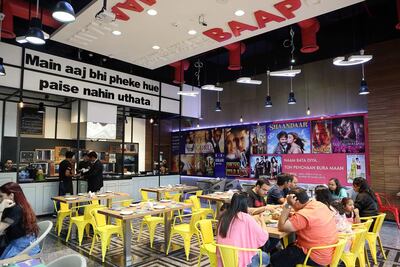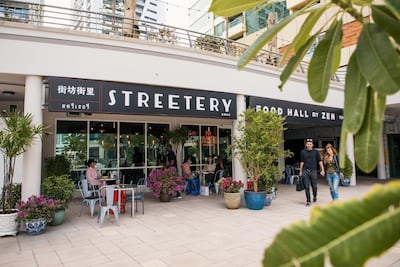With the restrictions taken to combat the coronavirus pandemic, restaurants across Dubai fear closure if delivery app commissions aren't slashed, and other measures taken.
However, that argument has hit a stalemate as restaurant aggregators such as Talabat argue that they too have a business model to protect, and cannot cut commissions, "not even temporarily".
With restaurants in Dubai moving to a delivery-only model, all revenue from dine-in patrons has been wiped out, meaning that if they don't have their own drivers, they are now liable to pay commissions of about 25 to 35 per cent on every order to delivery platforms.
While it is standard practice for third-party services to take a cut of restaurant orders, on top of the delivery fee charged, restaurateurs have spent weeks calling on them to revisit their percentages.
The National has spoken to the owners of more than a dozen restaurants in Dubai and Abu Dhabi. On average, most say they are making about one-quarter to half of their usual revenue, and say commissions from aggregators and the expectation to offer discounts could shut them down permanently.
'More than 95 per cent of our revenue is gone'
Punit Achria is the director of two Dubai concepts – Barbecue Delights, which has four outlets, and My Shawarma, which has three. Only one Barbecue Delights outlet is currently open, in Motor City, and two branches of My Shawarma.
Achria is currently only taking about 40 orders per day in one outlet, compared to the 120 on average he would usually do. Across seven outlets, that's roughly 120 of a usual total of 840 orders.
Commissions paid to the likes of Deliveroo, Zomato, Uber Eats, Careem Now and Talabat then come off each of those orders.

Falling revenues were further hampered by a fall in deliveries, with many people staying at home having more time to cook and less disposable income.
As a way to offset the heavy losses, Achria has had to send a majority of staff on leave.
"What else can we do? We hope to bring them back after this ends, but we aren't expecting it to for at least another two months... and we will be feeling these losses for at least six months after that."
Stories such as Achria's are common in the UAE restaurant community at present.
At the extreme end, there are those such as Hadi Al Hakim, owner of Tony Roma's steakhouse, which has outlets across the UAE, who says dine-in customers made up 90 per cent of their business. Of the remaining 10 per cent of revenue that came from deliveries, this has now dropped by about 60 per cent, leaving them with 4 per cent of their total revenue.
Or those such as George Ninan, owner of brand Back to Grills, who has both a restaurant and a separate delivery-only cloud kitchen in Dubai. Similarly, his dine-in sales usually made up 60 per cent of the business for the restaurant.
"The delivery proposition through the aggregators has never been profitable because over 55 per cent of the total sale price goes in the form of aggregator commission and discounts, which then leave nothing for the restaurant operator to cover other expenses," he says.
"Quite often we spend more than the actual sale price to fulfil an order."
Across both platforms, Ninan says he would usually do 1,200 orders per month. While that number is about the same now, a complete lack of dine in has meant a monthly fall in revenue of about Dh70,000.
'We can't even cover our daily electricity costs'
Sharmili Jagdale's restaurant, The Mumbai Social, opened in Karama just one week before Dubai moved to a delivery-only model. They are now receiving four to five deliveries per day, which puts their total weekly revenue between Dh2,100 and Dh2,800.
After approaching Zomato and being offered a rate of 28 per cent commission, he now pays Dh3,500 to a third party delivery platform per month for 600 deliveries – a quota he doesn't even come close to fulfilling.
What is left, Jagdale says, "doesn't even cover our daily electricity cost".
"If we give away a huge chunk of our order value, how do we sustain our business?"
In Abu Dhabi, however, pick-up takeaway orders are still permitted until 8pm.
It's a small mercy for Victor Paul, manager of Four Buns Burger, who says he usually made more than Dh360,000 in revenue under normal circumstances, including dine-in (Dh130,000), takeaways and deliveries (Dh115,000 each).
Since the pandemic outbreak, he estimates he is making just Dh90,000 between deliveries and takeaways, after commissions. Of the Dh40,000 he has made on deliveries, 27 per cent of that (Dh10,800) has gone to Talabat.
Talabat: 'we cannot and should not take on this responsibility alone'
The National approached all food aggregators in the UAE for comment.
Zomato and Deliveroo declined to answer questions.
Gheed El Makkaoui, General Manager of Careem UAE, says it is not possible for them to reduce their commission any more than the 15 per cent discount on the 19 to 25 per cent taken. They offered this in March.
"This crisis has not been easy on the economy or the public and this is one way we can support other home-grown restaurants."

Talabat chief executive Tomaso Rodriguez says they have introduced several initiatives to support restaurants. These required "significant investments" he says, and include location-based free deliveries and deferring commission payments for six months.
To those calling on food delivery platforms to "go even further in bringing relief to the restaurant community" by reducing their commission fees, Rodriguez says there are "several reasons why we cannot do this, not even temporarily".
"First, when times are uncertain, asking businesses to voluntarily decrease their revenues by over 60 per cent in support of other businesses in that supply chain does not make business sense, it simply shifts the problem to a different part of the supply chain – at a time when restaurants need platforms more than ever."
While Rodrigues would not discuss in detail what percentage commission they charge and where exactly that goes, he says revenues are mostly generated through commissions on orders and a delivery fee from the customer.
That revenue is then allocated three ways: the entire commission, as well as a high portion of the delivery fee, goes directly to paying for the delivery.
Of the remaining revenue, Rodrigues says, more than half is used on "marketing campaigns, promotions and other incentives" for the "betterment of the restaurant industry".
"The final and remaining, very small percentage of revenues goes to Talabat," Rodrigues says.
"We use this to pay our fixed costs – rent, power, water, admin, plus our people. This is well over 2,000 employees throughout the region... Our extensive efforts will still not be sufficient to help the entire restaurant community get through the Covid-19 situation," he says.
"We cannot and should not take on this responsibility alone."
'There needs to be an industry-wide conversation'
The debate comes as data from a survey of thousands of chief executives in 109 countries points to the hospitality and restaurant sector as the most vulnerable industry, with 41 per cent of respondents saying their firms were at risk of not surviving, according to Reuters.
Jake Young, who runs the Middle East arm of hospitality consulting firm VSAG, says it was important there was an "industry-wide" discussion on how delivery platforms and restaurants could work together going forward.
"When you look at it from the outside, all the segments of the chain are siloed, especially in the Middle East... and neither the restaurants nor the aggregators are talking to each other, they're just arguing over who is more affected.
"We need more cross-industry talks about how to work together to get things thriving and surviving."
While both restaurants and aggregators have businesses to fund, Young says things are slightly more precarious on the side of the restaurateurs as their business models are set up to account for a large amount of dine-in customers, on which they obviously do not have to pay any commissions.
However, he notes some aggregators don't actually make the bulk of their money from conducting deliveries, they make profit from data. He points out that aggregators can also leverage their platforms and widen out their services, contracting themselves out for other delivery services such as e-tailers or pharmaceutical companies.
"What I'd really be advocating for is that they bring in industry leaders to discuss these problems and talk about solutions. I'm not sure there's a solution for everyone to survive, but they have to have a hard look at what everyone can do."
So what is the solution?
Vivek Shah, who owns two outlets of his Bol Gappa restaurant, is attempting to form something of a restaurant association in order to take plans of action to the government.
He is calling for aggregators to cap their last mile commissions at 15 per cent and marketplace commission at 5 per cent. Last mile refers to the delivery of a product by an aggregator, whereas marketplace is the commission for being listed on a centralised hub.
"The industry is in crisis with many restaurants either closed or on the verge of closing down unless some drastic support is provided," he says.
He says he is now doing 10 to 15 per cent of his normal business, with just one outlet still open, and is unsure whether they will survive. The compounding factors of commissions, lack of business and high rents have left him "bleeding" cash.
"In current times, it is just impossible to sustain," he says.
"Whether or not we sell [food], we have to pay salaries to our staff and rent to our landlord. We could possibly manage for another 30 to 60 days at max but not beyond that."
The safety in numbers approach has also rung true for Nicky Ramchandani, managing director of popular food hall Streetery in JLT. He has joined a WhatsApp group called the UAE Restaurant Community, which now consists of about 200 restaurant owner-operators, sharing information and supporting each other's businesses.
Many of them are now "barely breaking even".
"The current focus for now is identifying issues we are collectively dealing with, which ranges from aggregator commissions to gas prices, rents, government regulations etc," says Ramchandani.
Streetery's model was "built around a great dining experience", he says, with up to 70 per cent of revenue coming from customers dining in, leaving them with about 30 per cent to operate on.
Ramchandani says an average restaurant can be charged between Dh15,000 to Dh40,000 per month on commissions, not including discounts, and "deferring a payment is just taking on a debt at a time when you cannot, no matter how great the terms".
Laura Nahas, owner of Mezza Lebanese Kitchen in JLT, has chosen another method, removing the restaurant from all delivery platforms last week for three days, offering customers a direct 30 per cent discount on orders.
"We would rather pass on the savings to you," the restaurant wrote in an Instagram post announcing the move. Nahas says she reached out to all aggregators on March 24 to ask what support would be offered in light of the pandemic, and was "disappointed" at a lack of replies. She estimates her revenue has halved.
"Don’t get us wrong – we like working with the food aggregators. They offer great value to customers and restaurants," she says. "But now, with half the restaurant closed and being solely dependent on delivery, when 25 to 35 per cent commission is being taken per order and the food app aggregators driving discounts to get more market share over their competitors it is not only hurting local businesses – it is shutting them down, permanently."




